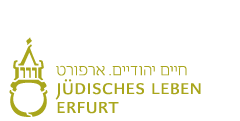Jewish businesses
The Jewish population in Erfurt was a little bit less than one percent of the total – in 1932 the Jewish community had 1,290 members. Jews were a self-evident part of Erfurt’s economic life. According to the statistical research by Heinrich Silbergleit for the weekly paper of the Erfurt synagogue congregation in July 1927, Jews in Germany were notable for their particularly strong urge for economic independence out of a lack of alternatives, and so were significantly more likely than non-Jews to be the owners, partners or directors of businesses.
The prominence of Jews was particularly pronounced in the textile industries, the leather and fur business, banking as well as in the grain, seed and livestock trade. Despite the lack of concrete data, the few references passed down indicate that the structure of Jewish businesses in Erfurt around 1933 differed little from other regions of Germany. In Erfurt, Jews engaged with particular success in the trade and manufacture of textiles, leather and footwear. Apart from that there were also department stores as well as paper, bicycle, paint and seed shops present in town – in short a broad palette of entrepreneurship.
Apart from the multitude of small and medium sized Jewish businesses there were also some big and well-known trading firms owned by Jews. A prominent example was the department store Römischer Kaiser at the Anger. The merchant Siegfried Pinthus, who at first owned a small shop at the Domplatz near Kettenstraße, opened the lavish department store together with his brother-in-law Arthur Arndtheim in 1908. The Römischer Kaiser was the only large department store in the region. Both men were esteemed citizens of the city and were also active in the Jewish community and beyond.
In the shoe business M. & L. Hess had made a name for themselves. After 1870 Erfurt grew into one of the largest shoe-manufacturing centres, with M. & L. Hess being one of the five leading companies. The brothers Maier and Louis Hess founded their company in 1878. To start with only 25 workers worked in a small company in Erfurt in the street Löbergera, but the company expanded rapidly: From 1896 there were two major factories in Moltkestraße and Leipziger Straße. In 1922 the shoe company M. &. L. Hess employed 1,800 workers and 125 employees and was thus the second-largest enterprise in town. But they could not escape the effect of the Great Depression.
In December 1931 the owner Alfred Hess died from complications of an operation at the age of 56. The most important patron of modern art in Erfurt was praised by the weekly paper as a “noble and truly benevolent personality”. The museum director Herbert Kunze wrote in the Thüringer Allgemeine Zeitung: “The rise of the Erfurt Museum and the honourable reputation that it enjoys in the world of German culture, is not least owed to his constant and selfless readiness to help others. Alfred Hess was one of the best friends of the museum. He was the last great collector of the town.”
An engineering company that was significant beyond the town limits was the Berlin-Erfurter Maschinenfabrik Henry Pels & Co. AG, which made die cutters, presses and scissors. Its president was Henry Pels, a merchant’s son born in Hamburg in 1865, who had relocated his first machine factory to Erfurt in 1897 where he made contact with the firm J. A. John. The merging of the firms was the basis for the foundation of the Berlin-Erfurter Maschinenfabrik Henry Pels & Co. AG. Pels also died in 1931. The older generation who had built up their firms around the turn of the century were ageing or dying and the next generation in Erfurt were faced with the Great Depression and an increasingly hostile environment.
A banking house however was no longer amongst the established Jewish businesses. The private bank U. Ullmann, founded in 1875 by the later chairperson of the Jewish community Heinrich Ullmann, had defaulted at the end of the 1920s and gone into liquidation. Even though there were still Jewish banking houses in the region up until 1938 with D. Meyer’s Sons in Suhl, Wachen & Gumprich in Schmalkalden and Siegfried Weinberg in Leipzig, it is evident that the involvement of Jews in banking, so often conjured up by the anti-Semites, was diminishing with the rise of the large nationwide banks in the 1920s.
Source: Kreutzmüller/Schörle “Stadtluft macht frei?”
Jüdische Gewerbebetriebe in Erfurt 1919 bis 1939, Erfurt 2013
